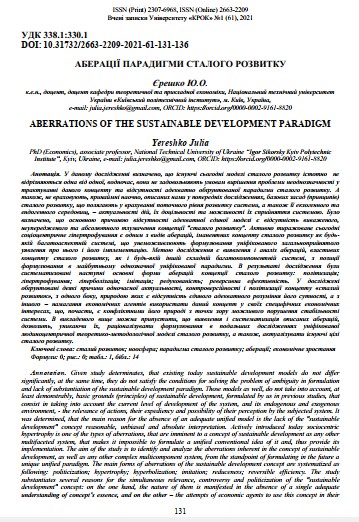ABERRATIONS OF THE SUSTAINABLE DEVELOPMENT PARADIGM
DOI:
https://doi.org/10.31732/2663-2209-2021-61-131-136Keywords:
sustainability, noosphere, sustainable development paradigm, aberrations, economic growthAbstract
Given study determinates, that existing today sustainable development models do not differ significantly, at the same time, they do not satisfy the conditions for solving the problem of ambiguity in formulation and lack of substantiation of the sustainable development paradigm. Those models as well, do not take into account, at least demonstrably, basic grounds (principles) of sustainable development, formulated by us in previous studies, that consist in taking into account the current level of development of the system, and its endogenous and exogenous environment, - the relevance of actions, their expediency and possibility of their perception by the subjected system. It was determined, that the main reason for the absence of an adequate unified model is the lack of the "sustainable development" concept reasonable, unbiased and absolute interpretation. Actively introduced today sociocentric hypertrophy is one of the types of aberrations, that are imminent to a concept of sustainable development as any other multifaceted system, that makes it impossible to formulate a unified conventional idea of it and, thus provide its implementation. The aim of the study is to identify and analyze the aberrations inherent in the concept of sustainable development, as well as any other complex multicomponent system, from the standpoint of formulating in the future a unique unified paradigm. The main forms of aberrations of the sustainable development concept are systematized as following: politicization; hypertrophy; hyperbolization; imitation; reduceness; reversible efficiency. The study substantiates several reasons for the simultaneous relevance, controversy and politicization of the "sustainable development" concept: on the one hand, the nature of them is manifested in the absence of a single adequate understanding of concept’s essence, and on the other – the attempts of economic agents to use this concept in their specific economic interests, which, in part, are conflict with its nature from the point of view of the possible impairment and violation of the system’s stability. As the result, it can be assumed, that the detection and systematization of the described aberrations will allow avoiding them in subsequent studies, while rationalizing the formulation of a unified human-centric theoretical and methodological model of sustainable development, as well as update existing goals of sustainable development.
Downloads
References
Turner, R. Kerry Sustainability, Resource Conservation and Pollution Control: An Overview. Sustainable Environmental Management. 1988. London: Belhaven Press.
Georgescu-Ruegen, N. The entropy law and the economic process, 1971 (No. 04; HB171, G4.).
O'Riordan, T. (1988). The politics of sustainability.
Earth Charter Initiative. What is the Earth Charter? URL : https://earthcharter.org/about-the-earth-charter/.
BI DSS Group Концепція Ноосфери та мережеві ергатичні організми, мережево-центричні системи і війни, Інтернет речей. 2019. URL : https://dss-bi.blogspot.com/2019/05/blog-post_17.html.
UN.org Sustainable Development Goals. URL : https://www.un.org/sustainabledevelopment/sustainable-development-goals/
Яловий, Г. К., Єрешко Ю. О. (2015). Методологія науково-технологічного розвитку в концепції постіндустріального суспільства. Економічний вісник Національного технічного університету України Київський політехнічний інститут, 2015. №12. С. 71-82.
Stosec Фрази дня. Джим Рон. 2020. URL : https://stosec.com/jim-rohn-2/.
Boehmer-Christiansen, S. The geo-politics of sustainable development: bureaucracies and politicians in search of the holy grail. Geoforum. 2002. №33(3). С. 351-365.
Hicks R. 8 brands called out for greenwashing in 2020. URL : https://www.eco-business.com/news/8-brands-called-out-for-greenwashing-in-2020/
Truth in advertising. Earth day 2021: companies accused of greenwashing. URL : https://www.truthinadvertising.org/six-companies-accused-greenwashing/.
O'Connor, M. The 'four spheres' framework for sustainability. Ecological Complexity. 2006. №3. С. 285-292
Petruzzello, M. Plastic Disaster:you’re your bags and bottles polute the oceans. URL : https://www.britannica.com/story/plastic-disaster-how-your-bags-bottles-and-body-wash-pollute-the-oceans
The Independent. Plastic bags were created to save the planet. URL : https://www.independent.co.uk/climate-change/news/plastic-bags-pollution-paper-cotton-tote-bags-environment-a9159731.html.



